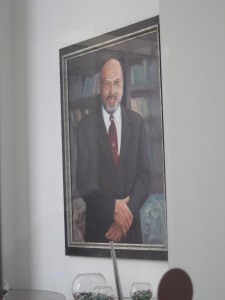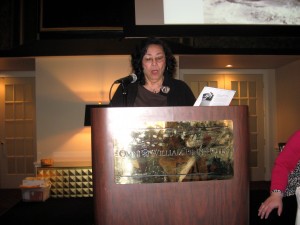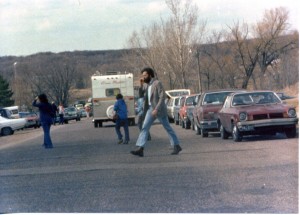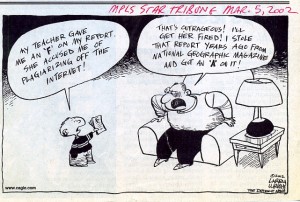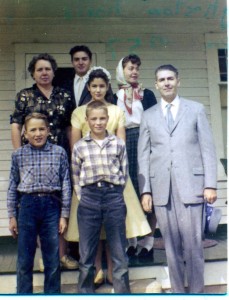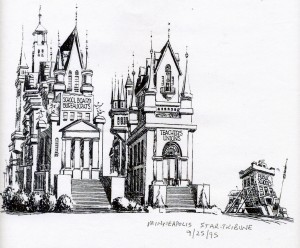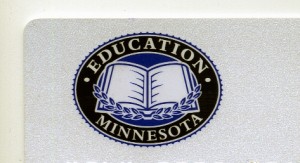Note from Dick Bernard: This Essay seems particularly appropriate to present at the anniversary of the bombing of Iraq March 19, 2003, and our seeming continued reverence for War as a solution for human problems.
Our wonderful friend, Annelee Woodstrom, grew up in Nazi Germany. She was 7 when Hitler came to power in 1933, and in 1947, after WWII, she came to the United States to marry the “Gentleman Soldier” from Crookston MN who she had met when the Army liberated her town of Mitterteich, which was and is near the Czech border, and later was just inside what became West Germany after the War. Since her marriage in 1947, she has lived in northwest Minnesota, most of that time in the community of Ada MN. She is a retired teacher.
The following essay is one which she presented recently to a woman’s group in her town. This is designed to go with a power-point presentation which I cannot present here, of course. It is her script for the presentation, thus the capitalized letters for emphasis. This essay is passed along with her permission.
Uncle Pepp was a prominent small businessman in the town – a baker. There were two Jewish families in the town. To my knowledge, both left and both survived the war.
Annelee has written two very well received books: War Child: Growing up in Adolf Hitler’s Germany; and Empty Chairs, about her life in the U.S. Her website is here.
Annelee Woodstrom:
During March 1945 I had been ill. In this excerpt from my book WAR CHILD you will meet my Uncle Pepp. He isn’t easy to forget!!
I knocked softly. Uncle Pepp opened the door and motioned to the big chair. “What can I do for you?”
“Nothing. — I came to say good-bye.”
“So good-bye it is,” Uncle Pepp mumbled. His voice and his demeanor startled me.
“If you are busy, I’ll leave.”
“No, you just sit there, and I’ll tell you when you can leave.”
RESTING HIS CHIN in his hands, he looked at me, pondering. “Everybody comes and tells me, ‘I’m leaving.’ Are you leaving today? You should be home with your mother, but you are out there, getting bombed and shot at just like the men.” His gaze went past me. “The men went and fought, but most of them didn’t come HOME.
The ones who DID are crippled for life in one way or another. Tell me, for what?” He nodded. “Oh, yes, for the THOUSAND Year Reich. What a Reich it is!!! It started with Adolf Hitler and a few crazy men — who hollered and screamed as they led us and lied — until everyone followed blindly into THE abysmal destruction of humanity. Now,— we drown in our own blood. How they have changed us.”
“Uncle . . .”
He didn’t hear me, and I didn’t dare to move as he went on.
“They didn’t change us, we did that ourselves. Now, the whole world will hold us accountable.”
He shook his head. “All my life I tried to do right. Then, in one minute, I ruined it all. Just because Cousin Karl joined the Nazi party and didn’t tell me, I pushed him into this damn war. Now he is in France, doing God knows what? Killing, fighting, or RUNNING to save himself. He shouldn’t have joined the Nazi party without telling me . . . SO I REFUSED TO sign that I needed him in the bakery TO SECURE FOOD FOR THE TOWN. Now, nothing is the SAME . — He and I have changed.”
I had never seen Uncle Pepp like this. I got up and GINGERLY
put my hand on his shoulder AND TRIED TO CONSOLE HIM. “It wasn’t your fault! It’s the war! The Government would have taken Karl anyway. Everybody has to go to war. AFTERnTHIS WAR ENDS, there won’t be any more wars, because there isn’t anyone left to fight.”
Uncle Pepp laughed bitterly. “You would think so. We learn a lot in a lifetime, but no one in THIS world learns about keeping peace. Every time there is a war, they say it is for some cause, and then it will bring peace FOR EVER !!! The human race is the dumbest species there is. For thousands of years legions of people have fought and maimed each other for one cause or another. They TOOK LAND FROM THEIR so-called enemy. When you look around, you see that years later they gave it back. Never mind the corpses UNDERNEATH THE LAND the young were told to conquer.”
Uncle Pepp’s eyes bored into mine. “You think this war is the
last war? Anneliese, don’t mind MY LAUGHING. Some day YOU MAY HAVE A SON who will get his draft notice to fight in another WAR . . . AND AGAIN they’ll promise you, ‘THIS IS THE LAST WAR OF ALL WARS.’ On the other side there will be a mother who will have to send her son for the same reason — TO STOP WAR! What we have NOT YET learned is the simple truth: Wars lay the seeds and breed another more horrible war than the ones before.”
Uncle Pepp came close to me. “I always told your papa you should
have been his first born son, but I’m glad you’re not. Maybe you will
make it through this war. You will, if you’re lucky and have a say
about it.” He kissed me on THE CHEEK,— “Now go, and do come back, you hear me!”
IT WAS March 1947 I WAS LEAVING GERMANY TO COME TO AMERICA AND MARRY KENNEY. MY COUSIN Erna boarded the train with me.
The wheels of the train grated over the worn-out tracks and sparks spewed as we reached Nuremberg. The train stopped near MOUNTAINOUS DEBRIS THAT FOUR YEARS AGO had been the railroad station.
Instantly, we were engulfed by moving masses and WE PUSHED AND SHOVED until we found an empty platform space. Dreading the layover, we PUT our luggage behind our backs, huddled to keep warm and watched. Children, women and men, stood SPRINT READY as they LOOKED and pointed down the trodden path where an American PATROL CAR turned the corner.
At will, the soldiers flipped cigarettes and cigarette butts IIN THE watchers’ direction. The Americans talked, laughed and shook their heads at the spectacle they had created. The watchers sprinted forward until they spied a cigarette landing near them. Within a flash, they threw themselves on the ground, pushing, and fighting until SOMEONE ROSE, arms raised, jumping joyfully and clutching their treasure while their friends cheered.
Erna and I knew that cigarettes were sometimes better than money. With a good barterer, enough cigarettes could sustain the hungry or sick. We watched silently as men traded seven cigarettes for a pound of flour. Another group traded for water, and while the hunger-driven sat and salivated, their chosen leader mixed the flour with water until he held a lumpy dough. Eager hands pulled the dough into sheets that hardened none too soon for the lucky owners. No one took chances WITH THEFT; they devoured the finished product and the hunger pains were stilled for now.
Near us crude scaffolds covered with scribbled messages and weather-beaten pictures of soldiers, children, and families were the meeting places for refugees and all the other survivors of the war. These messages and pictures were the lost and found network of Germany’s twentieth century’s mayhem and madness.
We were overwhelmed by the constant motion that surrounded us. Dressed in tattered clothes, which were probably all they owned, bedraggled hollow-eyed homeless walked by looking for a space where they could perhaps stay for a few hours, or maybe a night. Others searched for a familiar face, or someone who might know the whereabouts of missing family members, friends, or acquaintances.
Groups of people groped through the rubble for anything that could keep them warm.
The most pitiful sight was the refugees. They had lost their homes which had been built by their ancestors centuries ago. Torn apart for the past four years by the ravages of war, families still huddled on their wagons or on the ground. Their nomadic life had taken its toll, and there was no end to the misery that surrounded us.
Disbelieving, WE STARED at bands of German soldiers who had withstood years of fighting on all fronts and were now clad in ill-
fitting shirts, pants, and jackets. Some had lost their limbs, their
hearing, or their sight. The more fortunate ones still had shoes, others had rags tied around their feet. Most soldiers had discarded their Army uniforms, while others wore them ONLY in the darkness OF NIGHT to keep warm. The daily struggle for survival, the unsuccessful searches for their loved ones, and the constant reminders of a lost war had robbed them of their once proud stance.
Children who had been taken from air-raided cities and relocated in designated safety zones WERE NOW ORPHANS — they survived because they had joined street gangs.
Tired and discouraged, we boarded the Wurzburg-bound train.
We stood by the window and viewed in silence what once had been THE BEAUTIFUL CITY OF NUREMBERG. We had heard that unrelenting bombing raids had obliterated the city, but we had never seen such total chaos before.
For miles, — as far as the eye could see, burned-out shells of homes
stood only because the mountains of rubble did not permit them to fall and come to rest. Uninhabitable buildings stood with gaping holes in their sides exposing denuded rooms, and the JAGGED remnants of walls thrust their ragged edges toward the heavens, lamenting their fate. Streets were now winding footpaths through piles of debris.
Throughout the remainder of our trip, through Wurzburg and onto our final destination, Frankfurt/Main, ERNA AND I realized that our Fuehrer had gotten his wish. In 1944, as the Allies encircled the
borders of Germany, shortly before his self-inflicted death Adolf
Hitler had shifted responsibility and blame for Germany’s military collapse onto his people. At meetings, he raved at his district leaders and generals that his people had betrayed him. They were cowards, and they deserved DEFEAT, HUMILIATION and even DEATH at the hands of GERMANY’S enemies. Now, his wish was reality. Germany lay in ruins, its people were destitute, and the once-feared Army had been annihilated. Germany’s regions were divided, and its borders were guarded by four allied nations.
Frankfurt, in twilight, was an image of grotesqueness and it embodied the savagery of war. The stately, CENTURIES OLD stone and brick houses lay reduced to rubble that flowed like lava out into the streets. Weather-beaten cardboard signs with crude, black letters pointed the way to avenues and streets. As the train stopped, we noted that the customary friendliness toward strangers we had taken for granted before the war, was no longer with us.
After my heart-breaking good-by with Erna, I landed in New York , met Kenny , and we took the train to Washington DC
TO MEET WITH [then-Minnesota] Congressman Hagen.
As we left the UNION STATION, Kenny hailed a taxi. The driver joined the evening traffic. The darkness of the night did not penetrate the streets of Washington, D.C. Lights glared everywhere, YET, the traffic flowed smoothly and steadily. I found no chaos here, nor morbid darkness. Everything was so unlike the Germany I had known these past eight years.
I continued deep in thought while Kenny and the driver talked. Suddenly, Kenny put his hands over my eyes and made sure
I could not peek out.
The taxi stopped. KENNY REMOVED HIS HANDS, — Lights engulfed everything around us, and the brightness made me blink rapidly.
Abruptly, I sucked in my breath and shivered as goose bumps crawled through my skin. Wonderstruck, I sat SILENTLY. The beauty and the massiveness of the [U.S.] Capitol Building was beyond anything I could have imagined.
It seemed the past and the future HAD merged RIGHT HERE, and penetrated into the very interior of our car. Thoughts and feelings bombarded and captivated my whole being. I felt so SMALL and insignificant, YET so special at the same time. I hugged my own body and sat still until Kenny spoke to the driver. He started the car and we were silent while he drove past the White House, the house where President Harry Truman lived.
Slowly, I understood I WAS TRULY in another world. How beautiful it was! How stately! How serene!
Realization crept into my mind and took hold. “So that is the way PEOPLE LIVE — where there is peace!” I said softly. TEARS welled up IN MY EYES until the lights were a blur. I THOUGHT OF MY LOVED ONES IN GERMANY AND WISHED, “If only Mama and everyone, everyone in the world could live where there is peace!”
I suddenly felt drained and sad. I had not known peace and serenity since I was in SEVENTH GRADE waiting to celebrate my thirteenth birthday.


